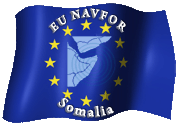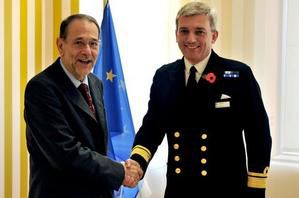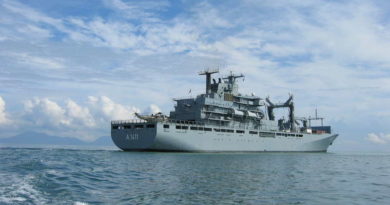EU anti-piracy operation launched. The device of Atalanta (V4)

(B2) The European Union launched this December 8, as indicated in the document (revealed on B2 a few days ago), the European operation against pirates (Eunavfor Atalanta). A "robust" mission declared Javier Solana, at the end of the meeting of the Ministers of Foreign Affairs of the 27 to some journalists. " The first naval operation in EU history ". which is not without risk. THE " rules of engagement of the operation will be solid », allowing to use « all means up to arrest and trial ».
A one-year operation
The operation will last one year, more or less divided into three periods of four months each (December-March, April-July, August-November). It should bring together between 7 and 8 ships, in the long term, 2 planes, and helicopters (each boat is equipped with them), and about 1200 men. In order to ensure the duration of the mission, it is in fact about twenty ships/crews, which must be found, that is to say approximately 3000 men.
According to the operation plan, the "minimum operational capability" will be possible in mid-December, as soon as the force commander's boat (the Greek boat) is present (it leaves only from Piraeus on December 10). "Initial Operational Capability" (IOC) is expected to be achieved in January and "Full Operational Capability" (FOC) is expected in April or May.
The operation should thus start with 4 boats at the beginning (France, United Kingdom, Greece, Germany even Italy), 7 boats in May (with Spain and Sweden). The Netherlands and Belgium, taking over later. Suffice to say that the “first months will be decisive” as a senior officer points out.
A truly European command
The operation will be commanded by British Rear Admiral Philip Jones from the British Operation Headquarters (OHQ) in Northwood (pictured with Javier Solana).

His deputy will be French rear-admiral Jean-Pierre Labonne, currently deputy to the admiral commanding the French naval action force in Brest (he will later be relieved by a German). On site, the Force Commander (at sea) will be rotated between Greece, Spain and the Netherlands. It is the Greek commodore Antonios Papaioannou who should thus command the force, from December, from the Greek frigate. He should be replaced in April 2009 by Captain Juan Garat Caramé (Spain), then by a senior Dutch officer from August 2009. The logistics base will be located in Djibouti (with about fifteen men) .
Who provides what?
La France provides a frigate and an air patrol aircraft (Atlantique 2), as well as various logistical resources from its permanent base in Djibouti. All these resources are already there. This is the surveillance frigate Nivose - normally based in Reunion - who will carry out this mission until December 15. It will be relieved by notice on "Chief Petty Officer L'Her" (F-792) until the end of December. And the surveillance frigate "Floreal" (F-730) - also based in Réunion - will then take over.
Le United Kingdom provides a frigate, the "HMS Cumberland" (F-85), which is already in the area, under the permanent NATO group (the SNMG2). It could then be relayed by the "HMS Northumberland" (F-238).
La Greece provides the flagship, a frigate"Psara", and his helicopter. Which should arrive in the area on December 16.
THEGermany provides a frigate, the "Karlsruhe" (F-212), as well as commandos who will take place in sensitive merchant ships, and only hours of air patrol. Germany will first take care of the protection of the WFP ships (taking over from the Dutch who perform this function under the national flag.) The government must make the proposal on Wednesday, and the Bundestag must approve such a mandate (normally on December 16).
L'Italy could also send a frigate. But the decision is still under discussion in Rome.
2nd period -
THESpain provides a P3 Orion surveillance plane, ie 400 men. The plane, based in Djibouti, is already in service and has already carried out certain protection missions. It will provide for the second period, a frigate, the " Victoria as well as a logistic support vessel.
La Sweden promised two navy corvettes and a support ship (150 men) to accompany WFP ships from April-May, according to Defense Minister Sten Tolgfors. The decision must be confirmed by the government and Parliament (a bill is being prepared by the Ministry of Defense and Parliament could decide at the beginning of the year).
3nd period -
The Netherlands already have a frigate, the " Hr Ms De Ruyter and the "marine commandos" who, since October, have been protecting World Food Program boats which are transporting humanitarian aid to Somalia. It remains under the national flag. It should enter the country soon. But the kingdom of Queen Beatrix should send ships back to the area for the third period (in August).
La Belgium provides a frigate, the Louise Marie (F-931), based in Zeebrugge, will come alongside the Dutch ships to reinforce the European force during the third period of the operation, from August to November 2008 (read: The Belgian frigate will not arrive until September).
Third States -
The participation of third countries is not yet really fixed (1). The United States, Canada, Pakistan, Denmark (*) already have boats in the area under the anti-terrorist coalition TF 150 (in which the United Kingdom, Germany and France also participate). Russia and India are also present in the Gulf of Aden. South Korea, Egypt, Ukraine are considering sending warships. Failing "integration" of certain countries, close "coordination" should be envisaged.
(Nicolas Gros-Verheyde)
(1) Read: the participation of third States
(*) Member State of the EU, it does not take part in the Europe of defence. In this respect, it is therefore considered as a "third country", and a specific agreement must be concluded for its participation.
Updated December 9.
